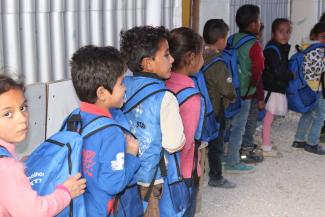Education
Initiatives that help refugee children

Several innovations aim to close some gaps in funding refugee education. One of them is the “School-in-a-box” initiative of UNICEF, the UN children’s agency. It operates centres in Dubai, Panama and China from which it can send supplies to schools worldwide within 48 hours. According to Unite for Sight, a global charity, “the School-in-a-Box kit has educated millions of children and refugees worldwide”.
Another innovation is Zambia’s “Book Bus”, which is operated by a non-governmental organisation (NGO). The Book Bus provides books, storytelling materials and libraries for children and teachers in Zambia, Malawi and Ecuador. This is not a refugee initiate as such, but it helps underserved children and adults in refugee camps.
For example, the Book Bus has worked in Zambia’s Meheba Refugee Settlement, visiting each school in the camp. Stories were read aloud and support given for planning lessons.
A third initiative has arisen in Uganda, where the Finnish Refugee Council (FRC), an NGO, has supported adult literacy training and English language learning groups in refugee camps. The FRC’s Massimo Lanciotti noted in 2019 that the FRC was the only NGO providing that kind of aid. He appreciated, however, that UN Women had started a literacy programme for South Sudanese women in four districts in northern Uganda.








